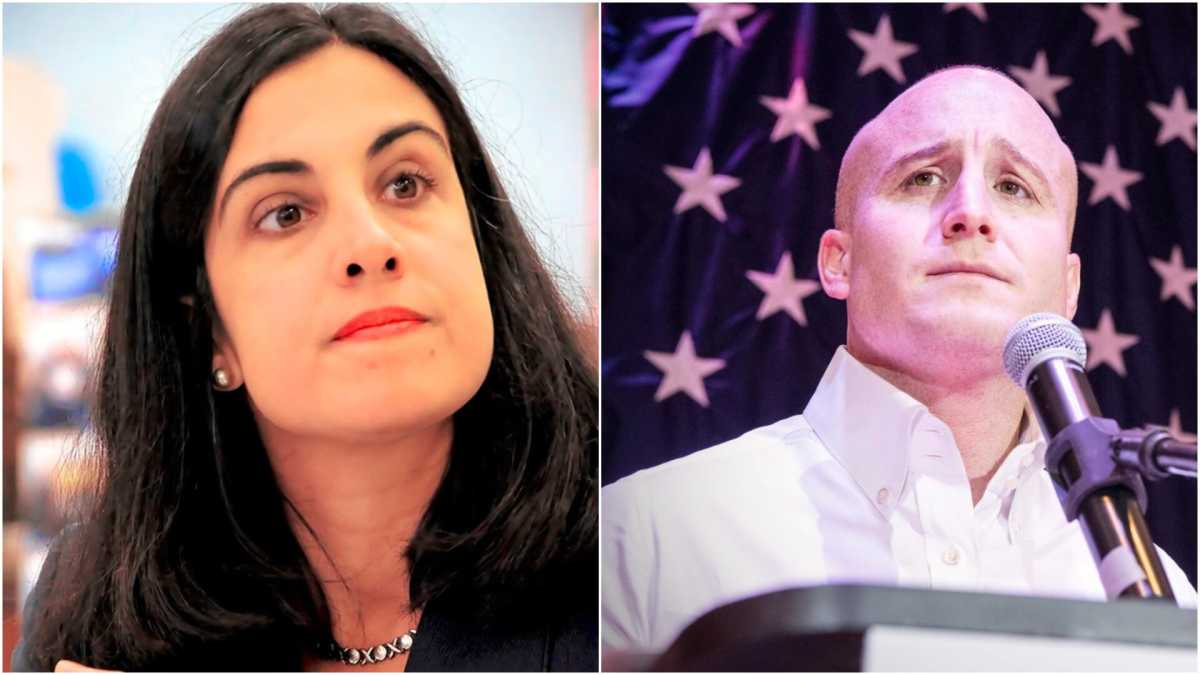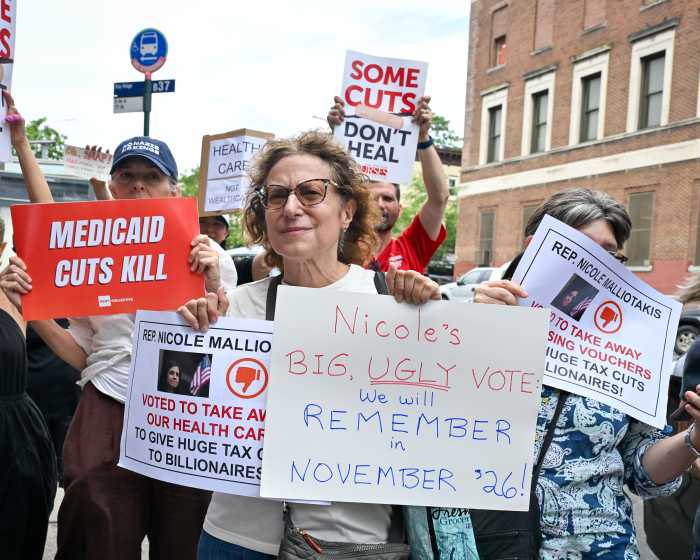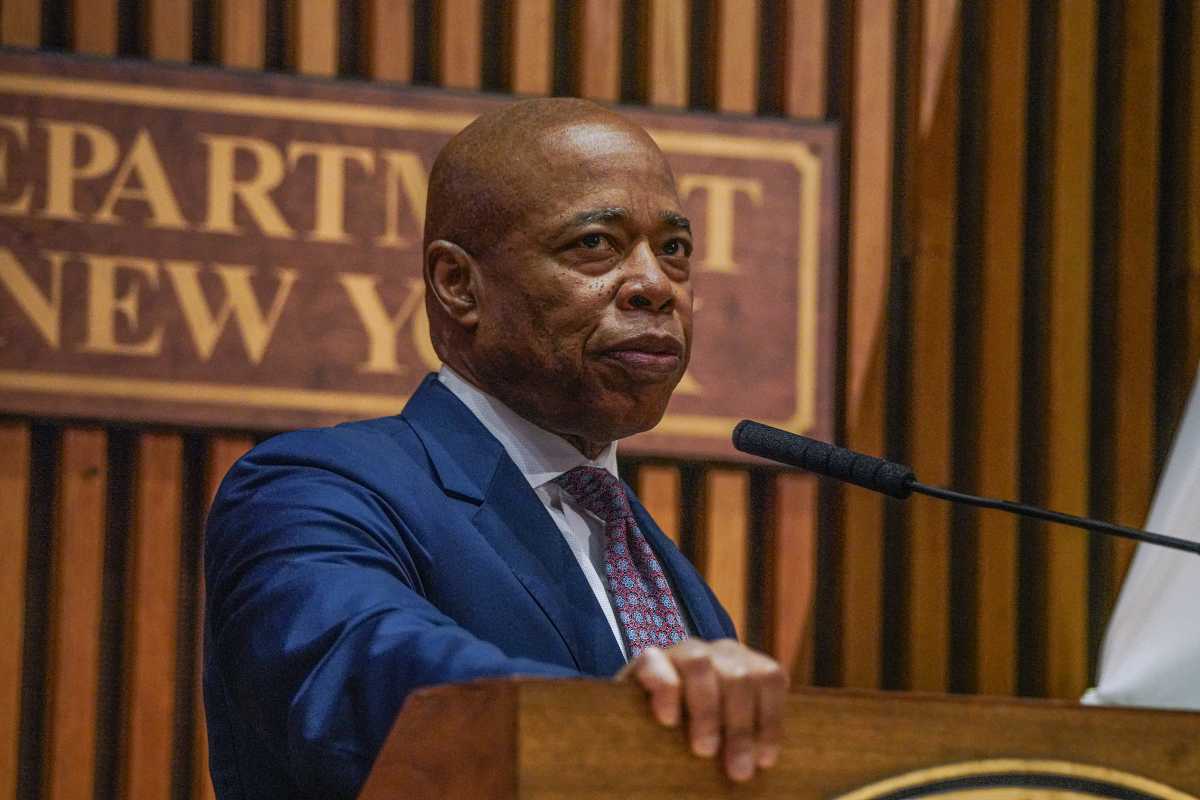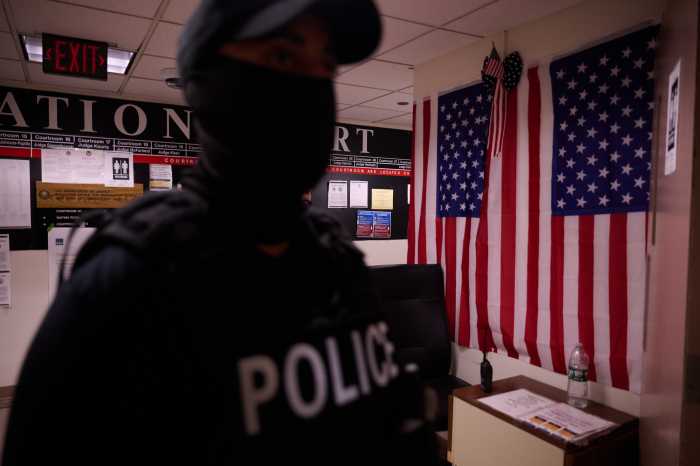Election day, less than two weeks away on Nov. 3, will decide the winner of the heated race for the 11th congressional district encompassing Staten Island, Bay Ridge, Dyker Heights, Bath Beach, and a part of Gravesend. The race has shaped up to be one of the most-watched in the country, as freshman congressman Max Rose, a Democrat, fights to hold onto his post in the district that voted overwhelmingly for President Donald Trump in 2016.
Scathing attack ads from Rose and his challenger, Nicole Malliotakis, have taken center stage in the election. But in interviews with Brooklyn Paper, both candidates dug beneath the mud-slinging, and elaborated on their policy views and visions for the district.
Political achievements
Malliotakis: A Staten Island native, Nicole Malliotakis was first elected to the state assembly in 2010 to represent East New York and New Lots. Since 2012, she has served as assemblywoman in the 64th District covering northeast Staten Island and a sliver of Bay Ridge. Malliotakis ran against Mayor Bill de Blasio on the Republican ticket during his reelection campaign in 2017.
Malliotakis said that some of her proudest achievements include the restoration of local and express bus service in southern Brooklyn and Staten Island, her successful efforts to strip pensions from elected officials who were convicted of crimes, and her work to help the district recover and rebuild after Superstorm Sandy.
She said she’s also proud of her public safety efforts. She pushed Mayor de Blasio to allow police to cooperate with ICE to detain undocumented immigrants who commit sex crimes in 2017, and pressured the state legislature to make homicide, manslaughter, and felony drug charges potentially bailable offenses under the 2019 bail reforms.
Hear her full answer here:
Rose: Max Rose, a Park Slope native, served in the armed forces for five years and earned a Purple Heart in the War in Afghanistan after his vehicle hit an improvised explosive device, injuring him. He served in New York’s National Guard before successfully running for congress in 2018, narrowly beating Republican incumbent Dan Donovan.
Rose said that in his two years in office, he’s most proud of a bill he co-sponsored that would permanently renew funding to the Victim’s Compensation Fund, which provides aid to victims of the 9/11 attacks. He also touted his bill that puts sanctions on foreign pharmaceutical companies that produce the majority of the country’s illicit fentanyl, and his efforts to mitigate COVID-19 in his district, which saw the first COVID-19 testing site in the city and a COVID-19 treatment center he helped build.
Hear his full answer here:
Controversies
Malliotakis: Malliotakis’ opponents have slammed her for embracing President Trump after saying she regretted voting for him during her mayoral campaign in 2017, and waffling on certain social issues, such as gay marriage. In 2011, Malliotakis voted against New York State’s Marriage Equality act legalizing same-sex marriage — a vote she says she now regrets.
“At the time, it wasn’t clear how it was going to impact religious institutions, if they were forced to perform marriages, and I wanted to have clarity,” she told Brooklyn Paper. “In hindsight, I would have changed the vote now, knowing what I know that it doesn’t have an impact on religious institutions.”
Malliotakis has said that President Trump won her over not long after he took office.
“At the time, he didn’t even have most of his Cabinet sworn in yet,” she told NBC News about the time she said she regretted her vote. “The president has done great work on behalf of our veteran community. He had created millions of jobs, brought our unemployment level to record numbers for minorities, for women across the board.”
Rose: Rose has always presented himself as a moderate who refuses to toe the party line, but throughout the campaign, Malliotakis has slammed Rose’s left-leaning voting record. Rose has voted in line with House Speaker Nancy Pelosi 96 percent of the time and with President Trump just over seven percent of the time. Some of the major votes Rose and the president have disagreed on include bills that would raise the federal minimum wage to $15 per hour and expand the Affordable Care Act. (Rose voted in favor for both.)
Rose, however, said that the raw percentages don’t capture his ability to reach across the aisle.
“Every single bill that I just laid out was bipartisan in nature and was supported by the president of the United States,” he said, referencing his bills extending the Victim’s Compensation Fund and sanctioning foreign pharmaceutical companies.
Rose also pointed to times he opposed his Democratic colleagues. He voted down the Democrats’ latest COVID-19 stimulus bill — which he said replaced the bipartisan bill he and some Republican colleagues had drafted — and did not vote for Pelosi for House speaker.
“When President Trump killed Qasem Soleimani, the Iranian terrorist, I stood up and said, ‘He did the right thing,'” Rose said.
Priorities
Malliotakis: If elected to congress, Malliotakis said she would focus on investing in local infrastructure to update the subway system and restore the state and local tax deduction known as SALT, which allows some home owners to get deductions on their local property taxes. She also would also propose putting a lockbox on certain federal funding for city and state entities, such as the NYPD, to make sure that the funding is used as it was intended, she said.
Rose: If reelected, Rose said he would prioritize addressing the COVID-19 pandemic by investing in public heath infrastructure and scaling up testing and treatment. To mitigate the economic fallout, Rose said he will work to earmark federal aid for healthcare institutions and for state and local governments.
He also said he would commit to a significant multi-trillion bill to update the country’s transportation infrastructure and invest in green energy, and that he would work to strengthen national security against foreign and domestic terrorists.
Lowering the Verrazzano-Narrows Bridge toll
Malliotakis: Malliotakis said state efforts to give Brooklyn residents a discount on the Verrazzano Bridge toll — which is the most expensive in the country at $19 roundtrip — have failed because some Brooklyn legislators don’t want to reduce the funds for mass transit, which the toll pays for.
“The problem with getting some type of relief is that there isn’t the will from our colleagues in some parts of Brooklyn,” she said.
Rose: Rose said he has authored two bills in congress that would help lower tolls nationwide. One bill introduced in May would allow the MTA to use toll revenue not just to fund public transit, but to provide discounts to locals. Another bill introduced in May would allow commuters who spend more than $1,000 annually on the toll to receive a tax credit. Neither bill has come for a vote as of Oct. 21.
“We’ve got to continue to fight not only to preserve the Staten Island discount, but also to get folks in southern Brooklyn a discount,” Rose said.
Supreme Court nomination
Malliotakis: Malliotakis said that as sitting president, Donald Trump had every right to nominate justice Amy Coney Barrett to the Supreme Court during an election year, and the senate is obligated to continue with the proceedings as usual.
“He’s the president of the United States and there’s a vacancy, it needs to be filled,” she said.
She added that she did not take any public stances on the former President Barack Obama’s nomination of Merrick Garland in 2016, but suggested that if she had, she would have been for it, too.
Rose: Rose said that he was opposed to the Senate continuing with the confirmation of Barrett during an election year, and said it should be the voters’ choice to decide who should replace Ruth Bader Ginsburg.
“I believe this is an act of incredible hypocrisy. Mitch McConnell, Lindsey Graham … they said when it came time for Barack Obama to make an appointment his last year of presidency, ‘No, no there is no place for that in the final year of a presidential campaign,’ and now they totally flipped on it.”
He added that he was in favor of the proceedings with Garland in 2016, but that Republicans set a precedent by blocking those proceedings.
“If they set a precedent then, we have to stick with it here.”
Abortion
Malliotakis: Malliotakis is pro-life with the exceptions of the life of the mother, rape, or incest, she said, but added she doesn’t hold black-and-white views on abortion.
“I don’t think this is a black-and-white issue. I think it’s very personal to people. I would consider myself pro-life, my voting record is as such,” she said, noting her no vote on a state bill that would legalize late-term abortions.
Rose: Rose said he is completely pro-Choice and doesn’t believe in any abortion restrictions.
“I ardently believe that a woman should have the right to make decisions about her own reproductive health and about her body, with the consultation of a doctor of course, but she has the abject 100-percent right to make those decisions,” he said.
What makes you more qualified for the position?
Hear their answers below.
























